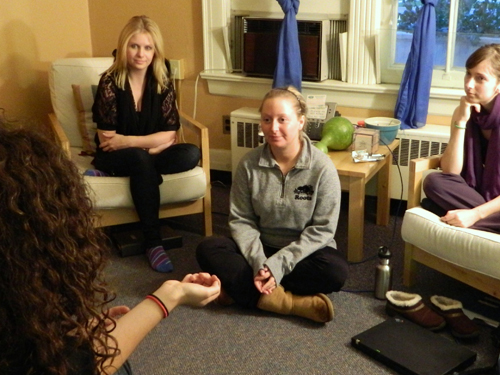
You’ve been feeling sad now for a couple of weeks. Sure, there’s plenty of things you like about being a student at U of G, but that last test didn’t go very well, your friends don’t seem to have time for you, and you hate to admit it but you’re missing your little sister. It’s normal to feel down at times, but now those unhappy feelings have become overwhelming and hard to shake. You start to wonder if you’re depressed, and if so, what you should do about it.
Molly Heffernan’s been there, too. The recent BA grad in sociology found herself feeling rather depressed and lonely when she was in third year, and went for some counselling sessions. Her counsellor sent her to the Student Support Network (SSN). Heffernan found them so helpful that by fourth year she was volunteering, and even though she graduated in April and has a full-time job, she still does her share of volunteer shifts.
“The people are so caring, I just couldn’t imagine not being here,” she says.
The Student Support Network is housed in McNally House on Gordon Road. Walk in any time between noon and 10 p.m., and you’ll find a couple of trained volunteers relaxing in the comfortable living room, ready to talk with you about whatever is on your mind. Rather not go in person? You can call 519-824-4120, Ext. 55002 and talk to a volunteer over the phone. If you feel you need some additional help or support, the volunteers have a long list of other resources you can be referred to. “We have a really safe, non-judgmental, confidential space here,” says Heffernan. “And we’re ready to listen.”
Students come to the SSN for many different reasons, but often they are sad or depressed, dealing with a relationship that has broken up, feeling anxious about school or other aspects of their lives, worried about having an eating disorder, feeling lonely or concerned about a friend who seems to be having problems. “It doesn’t have to be a huge thing,” says Heffernan. “It can be anything you want to talk about or get some support.” Sometimes people come in just to share some good news.
Many come just once, but often students return repeatedly for ongoing support.
There are 40 student volunteers working at the SSN. After completing the required training, they sign up for two-hour shifts, two volunteers at a time.
“When I started volunteering, I thought you needed to be a counsellor with years of training and experience to be able to help someone with mental health concerns,” says Heffernan. “I was surprised to see how, just by listening and asking questions, you can really help someone – you empower them to find solutions to their problems.”
She says those who visit the SSN often say, “This is so helpful when counselling is not an option,” and believes that this kind of peer support is especially effective for a number of reasons. One, because the volunteers are students, they understand the particular challenges university students face. “They are at the same stage of life, so they know what you’re going through,” says Heffernan. “Secondly, I think it helps that they are volunteers – it shows that they really care; they want to listen and be there for you and help you.”
Another goal for the SSN volunteers is increasing awareness of the prevalence of mental health problems and removing the stigma that often stops people with these problems from getting help. Statistics show that mental health problems are on the increase, and the university years are when many conditions, such as depression and anxiety, typically first appear.
“Having a mental health problem is a shameful thing for many people,” says Heffernan. “So people don’t talk about it, and they feel more and more alone. The more people are aware of the realities of mental health, the easier it will be for people to ask for help.”
For Heffernan, it’s the reward of connecting with someone and seeing them resolve their problems that keeps her volunteering with the SSN. She works at a group home full-time and is also giving presentations on mental health issues to schools in the Halton Board of Education. “Not all universities have a peer support program like SSN,” Heffernan adds. “It’s meant a lot to a lot of people.”